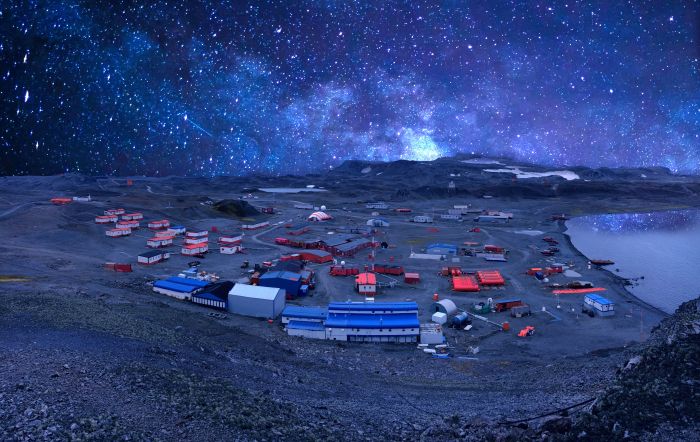Australia a Space-faring Nation: Imaginaries and Practices of Space Futures

This project investigates the challenges, opportunities and implications of outer space as a site of economic, political, environmental and cultural interest for Australia. Combining interviews with key experts, ethnography and creative practice, the project analyses how a range of imaginaries of outer space are produced. The study will develop new insights to understand and communicate the cultural significance of space exploration in direct response to renewed national and global interest in outer space research. By engaging with a range of space actors in Australia and internationally, the project will investigate government organizational practices, innovation across start-ups, scientific practices and First Nations’ perspectives in Australia. By producing a documentary film and through industry fora and public exhibitions, the results will both animate and inform public understandings of space exploration in Australia and internationally. These outcomes will be of benefit to scientific communities, governments and industry. Research outputs will contribute to national research capacity in social studies of science, foster opportunities for international interdisciplinary collaborations, and inspire Australian public engagement with space research.
Researcher: Professor Juan Francisco Salazar
Funding: Australian Research Council (opens in a new window), Future Fellowship
Period: 2020-2024
Reports
Download the report 'Framing the Futures of Australia in Space: Insights from Key Stakeholders'
This report, co-authored with Dr. Paola Castaño (University of Essex), presents key insights derived primarily from a set of 39 semi-structured interviews undertaken between October 2020 and May 2021 with 41 key actors in the Australian space sector. These actors represent a diverse range of perspectives from government, industry, science, law, and culture that constitute the space sector.
Presentations & Events
Futures and Dark Skies – 9 May 2021, Dark Skies Festival, Earth Sanctuary, Alice Springs.
Sensemaking about Space Roundtable - 17 August 2021
Watch a recording of the Roundtable (opens in a new window) chaired by Juan Francisco Salazar as part of a 9-part webinar series convened by The Academy of the Social Sciences in Australia. With Alice Gorman, Rami Mandow, Jeremy Walker and Ceridwen Dovey. This first session focuses on how we understand and make sense of space through historical, cultural, philosophical and social lenses.
Borders of Astrobiology: (un)disciplined Futures – 2 December 2021
Watch a recording of the invited keynote (opens in a new window) by Juan Francisco Salazar “Situating astrobiology: abductive reasoning, speculative thinking, planetary futures” for the Borders of astrobiology: (un)disciplined futures. Organised by AstrobiologyOU, a multidisciplinary research group at The Open University in Milton Keynes, UK.
Fricciones y tensiones en los imaginarios de futuros del espacio exterior – 6 July 2022
Watch a recording (opens in a new window) of the seminar presentation by Juan Francisco Salazar “ Fricciones y tensiones en los imaginarios de futuros del espacio exterior”. Diálogos Permanentes III, GT Antropología de las comunidades, los futuros y las utopías en Latinoamérica - Red RIOCOMÚN, Asociación Latinoamericana de Antropología.
Space Imaginaries Symposium – 18 August 2022
Museum of Arts and Applied Sciences– Sydney Science Festival (opens in a new window)
This hybrid one-day event curated by Juan Francisco Salazar and Dr. Deborah Lawler-Dormer (MAAS) brought together diverse voices working at the intersection of planetary sciences, humanities, law, social and environmental justice, and space exploration to discuss ways for thinking alternative narratives of space futures and undoing the legacies of colonialism in space affairs.
Ethnographies of Outer Space: Methodological Opportunities and Experiments - 1- 2 September 2022 - Trento, Italy
Paper “Cosmographies: experiments in speculative space ethnographies”
PhD Candidates
Ceridwen Dovey a fiction writer and essayist based in Sydney. She’s the author of several works of fiction (Blood Kin, Only the Animals, In the Garden of the Fugitives, and Life After Truth), and non-fiction (On J.M. Coetzee: Writers on Writers and Inner Worlds Outer Spaces: The Working Lives of Others). Her essays have been published by newyorker.com, the Smithsonian Magazine, WIRED, the Monthly, and Alexander. In 2020, she won a prestigious Australian Museum Eureka Award for her long-form essay critiquing the commercial push to mine the Moon. With the guidance of her supervisors, ARC Future Fellow Professor Juan Salazar and international space law expert Professor Steven Freeland, Ceridwen is undertaking a Doctorate of Creative Arts (DCA) within the School of Humanities and Communication Arts. Her primary project is to write a new collection of short stories about space objects and landscapes, Only the Astronauts. Her secondary project is to write and publish several essays about environmental ethics in outer space for a general readership as a way of inviting ordinary citizens and non-specialists into these important conversations about what kind of futures we are creating in space. She is also working with filmmaker Rowena Potts on a short experimental film, Moonrise.
Rob Nugent is a filmmaker grappling with entanglements, mainly between human and nonhuman places and situations. His films employ and critique various documentary forms and perspectives. They have arisen from purposefully taking a camera on speculative expeditions to remote locations in Indonesia, Guinea, Iraq, Ethiopia, Egypt, Tanzania and Australia. 'End of the Rainbow' was the story of an eternal gold mine, wandering from one place to another on planet earth. It won international film awards and screened in Europe, the US and Australia. ‘Memoirs of a Plague’, tackled the Locust story, heretically proposing that these Biblically imagined insects actually don’t cause famine. His last film, ‘Night Parrot Stories’, sought to reconcile western perspectives on a rare bird with other ways of knowing and thinking about Australian geographies. Rob would argue that how we have come to imagine Space is an eminently cinematic proposition and a logical progression from the strange contortions Gold, Locusts and Parrots have created in our minds. In between these longer film sojourns he is really fond of making short films repurposed from his favourite place of all, the cutting room floor.




